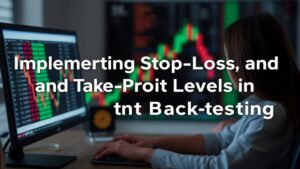Highlighting the Shift to Algorithmic Approaches
In today’s fast-paced financial landscape, automated decisions are no longer a luxury—they’re a necessity for savvy investors.
An Insider’s View: AI in Trading with a FinTech CEO
The landscape of financial trading is undergoing a seismic shift, propelled by the rapid integration of Artificial Intelligence (AI). As algorithms replace traditional methods, traders and investors are re-evaluating their strategies and tools. To gain deeper insights into this transformation, we reached out to a pioneering FinTech CEO who has been at the forefront of AI innovations in trading. This article delves into the practical applications of AI in trading, the challenges faced, and the future prospects of this revolutionary technology.
Understanding AI’s Role in Financial Markets
Artificial Intelligence has become a game-changer in the finance sector, especially in trading. Here’s how AI is reshaping the industry:
- Data Analysis**: AI algorithms can process vast amounts of market data in real-time, identifying patterns that humans might miss.
- Prediction Models**: Machine learning models are trained to predict stock movements, allowing traders to make informed decisions.
- Algorithmic Trading**: Automated trading systems execute trades based on predefined criteria, increasing efficiency and reducing emotional biases.
Real-World Examples of AI in Trading
To illustrate the impact of AI, consider these case studies:
- **Robo-Advisors**: Companies like Betterment and Wealthfront use AI to create personalized investment portfolios based on user data and risk tolerance.
- **High-Frequency Trading (HFT)**: Firms like Citadel Securities leverage AI to execute thousands of trades per second, capitalizing on minute price discrepancies.
- **Risk Management**: AI systems can continuously assess and mitigate risks by analyzing market conditions and portfolio performance.
Insights from the FinTech CEO
The CEO’s Perspective on AI Adoption
In our conversation with the FinTech CEO, several key points emerged about the adoption of AI in trading:
- Speed and Efficiency**: “AI allows us to make trading decisions faster than ever before. By analyzing data in milliseconds, we can capitalize on market opportunities before they disappear.”
- Enhanced Decision-Making**: “Traders using AI-powered tools can focus on strategic thinking rather than getting bogged down in data processing.”
- Accessibility**: “AI democratizes trading by providing sophisticated tools to retail investors, enabling them to compete with institutional players.”
The Journey of Implementing AI Solutions
Implementing AI solutions can be complex. The CEO outlined a few essential steps in this journey:
- **Data Collection**: Gathering high-quality, relevant data is crucial for training effective AI models.
- **Model Training**: Developing predictive models requires significant computational resources and expertise in machine learning.
- **Testing and Optimization**: Continuous testing is necessary to ensure the models adapt to changing market conditions.
Challenges of AI in Trading
Potential Pitfalls
While the benefits of AI in trading are substantial, several challenges must be addressed:
- Data Quality**: Inaccurate or biased data can lead to flawed predictions, undermining the effectiveness of AI models.
- Regulatory Compliance**: The financial industry is heavily regulated, and firms must ensure their AI systems comply with all legal requirements.
- Market Volatility**: AI models may struggle to adapt during sudden market changes or crises, leading to significant losses.
Ethical Considerations
The rise of AI in trading also raises ethical concerns:
- Market Manipulation**: There is a risk that sophisticated algorithms could be used to manipulate markets, leading to unfair trading practices.
- Job Displacement**: While AI can enhance efficiency, it may also displace human traders, leading to job losses in the industry.
The Future of AI in Trading
Emerging Trends to Watch
The FinTech CEO shared insights into future trends that are likely to shape AI in trading:
- **Increased Personalization**: AI will enable even more tailored investment strategies, catering to individual investor profiles.
- **Integration with Blockchain**: Combining AI with blockchain technology could enhance transparency and security in trading.
- **Natural Language Processing (NLP)**: Advances in NLP will allow AI systems to analyze news and social media sentiment, providing deeper market insights.
The Role of Collaboration
The CEO emphasized the importance of collaboration between financial institutions and technology providers:
- Knowledge Sharing**: By sharing insights and best practices, firms can enhance their AI capabilities and drive innovation across the sector.
- Partnerships**: Collaborations with tech startups can accelerate the development of cutting-edge AI solutions.
Conclusion
The integration of AI in trading represents a transformative shift in the financial sector, promising increased efficiency, enhanced decision-making, and greater accessibility. However, this evolution is not without its challenges, including data quality concerns, regulatory hurdles, and ethical implications. As the FinTech CEO highlighted, the future of AI in trading will be shaped by emerging trends, collaborative efforts, and a commitment to ethical practices. For traders and investors willing to embrace these changes, the potential rewards are significant, marking a new era in the world of finance. As we continue to witness the growth of AI technologies, one thing is clear: the future of trading is not just about numbers; it’s about intelligent, data-driven decision-making that can redefine success in the financial markets.



